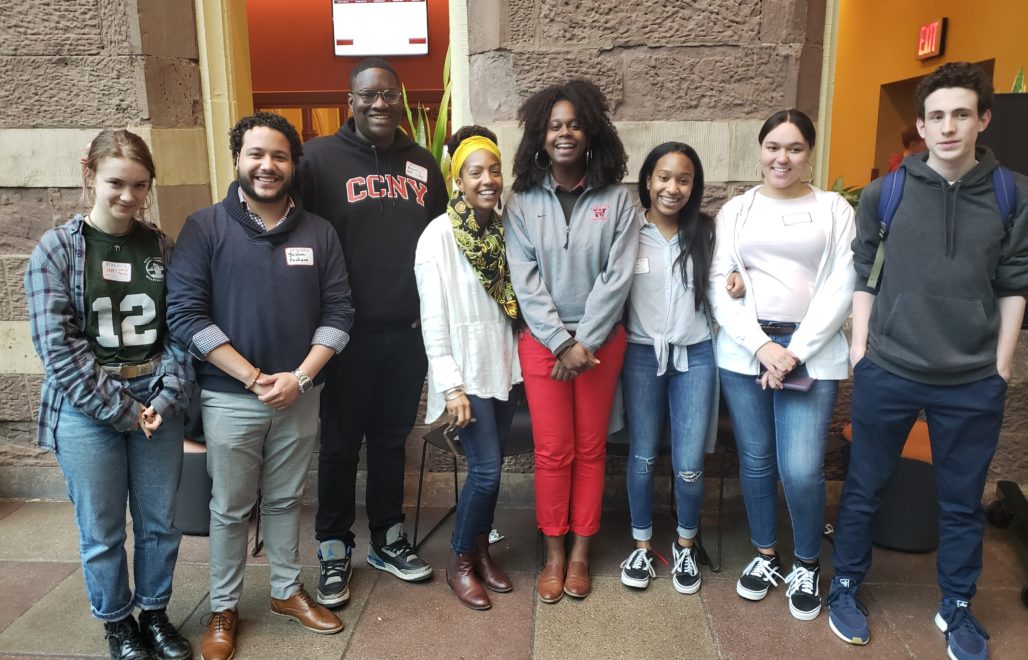Brooklyn in Solidarity: Disrupting Racism Through Restorative Justice

by Jack D. ’21
On May 1, 2019, NYC Independent School teachers, administrators, and students attended the third annual Brooklyn in Solidarity effort, hosted this year at the Packer Collegiate Institute. The workshop, organized annually by students attending five Brooklyn independent schools—Brooklyn Friends School, Berkeley Carroll School, the Packer Collegiate Institute, Saint Ann’s School, and Mary McDowell Friends School—is centered each year around a prevalent topic selected by students, including Gun Control last year, and Immigrant Rights in 2017. Student organizers of this year’s event included Brooklyn Friends School students from the class of 2021—Kayla N. Daelynn G., Ellis C., Jack D., and Jazz H pictured above). In planning the event, student organizers were provided with the support and guidance of BFS Director of Service Learning and Civic Engagement Natania Kremer, Packer Collegiate Institute Global Programs Director Tené Howard, and Berkeley Carroll School Director of Community Action Matt Budd.
This year, our team decided to focus specifically on combating racism through restorative justice, considering the tense climate regarding race in each of our schools. Rather than simply discussing the issue, our students partnered with three organizations to examine the ways in which restorative justice can be used as a tool to resolve such conflict. After months of planning, much of which took place during our biweekly Brooklyn in Solidarity elective course with Natania as well as after school meetings at BFS, Packer, and Berkeley Carroll, the event began with a brief welcome followed by a story-sharing activity. Facilitated by the student organizers, attendees were divided into small groups with the task of responding to a discussion prompt—describe an event that made you realize not everyone has the same experience in your school. In each small group, partners were required to share each other’s stories from the “I” perspective, giving attendees the opportunity to consider the experiences of others and put themselves in another’s shoes.
Following the activity, we welcomed a panel of four activists and teachers who have used restorative justice to resolve conflict at their schools and within their organizations—Joshua Pacheco from the Red Hook Community Justice Center, Nicole Hamilton and Cherkira Lashley from Girls for Gender Equity, and IntegrateNYC student-activist Frantzy Luzincourt. Each of the panelists had the opportunity to share their personal stories and instruct our audience on ways to think about conflict resolution, especially in an independent school setting.
Tenth grader Kayla N. shared her experiences organizing the event for the second year in a row:
I think that it is important to start a [relatively new] discussion about healing and moving forward in settings where you have experienced disrespect or pain, and even helping the parties involved learn from the experience so that it doesn’t have to happen again. Through planning and attending this event for the past two years, I’ve seen how beautiful showing up for each other can be, especially during times like these where solidarity is needed. I was able to get to know more people, and the experiences that made them so passionate about participating in the event, and bettering the spaces they have to exist in. I learned that there is a way for me to complete my years in this predominantly white institution, go into the real world, and still not lose myself. I learned that my experiences do bring lessons, and will always teach me, but I do not have to let myself be completely changed by the pain that I may feel in these spaces.
Another tenth grader, Jazz H., shared their experience attending the event:
Brooklyn In Solidarity reminded me of the importance of human connection. Our community partners shared the significance that building relationships and community hold within the work around restorative justice, which I saw to be true as the attendees connected with one another, shared their experiences, and learned from one another. I was fueled by the intentional sharing of the space that occurred as those who attended opened themselves to the community that was gathered.
The Brooklyn in Solidarity team would like to sincerely thank all students, teachers, and administrators who attended this event; we hope to see an even larger turnout in the future! We encourage students who are interested in helping support or plan next year’s event to speak to us about how to get involved.
